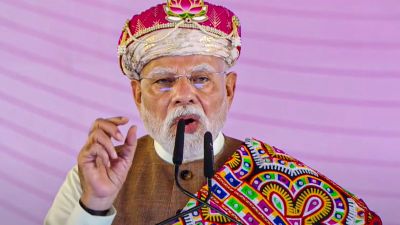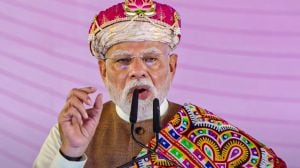Becoming PM is not a priority for me: Sonia
Congress president Sonia Gandhi said that becoming Prime Minister was not a priority for her. ‘‘For me, that (becoming Prime Minis...

Congress president Sonia Gandhi said that becoming Prime Minister was not a priority for her. ‘‘For me, that (becoming Prime Minister) is not a priority. My priority is to defeat this government. Let us see, when the time comes,’’ she said in an exclusive interview with The Indian Express editor-in-chief Shekhar Gupta for NDTV 24/7’s Walk the Talk.
In the interview, Sonia Gandhi spoke for the first time at length, with candour and confidence, on the one issue that has stalked her since she stepped into the political arena— her origin outside India.
She asserted more than once that she felt ‘‘completely Indian’’ and that the only time she felt a foreigner was when she was abroad. Asked if she thought that her origin might play a role in the elections, Sonia Gandhi was frank enough to say that ‘‘it may work’’ among certain sections, and then quickly added: ‘‘But frankly wherever I go, especially in rural areas, among women, among less fortunate people, I have never felt that I was a foreigner or they look at me as one—because I am not.’’ The last four words were said with great emphasis.
On whether she resented the foreigner tag, Sonia said, ‘‘No, not at all. It makes me laugh because I feel completely Indian.’’ Emphasising the depth of her Indianness, she added, ‘‘In fact, when I go abroad I feel a foreigner. Truly.’’
She said the transition (to becoming and feeling wholly Indian) had been a slow process. ‘‘The transition was completed quite long ago—it was a slow transition,’’ said the Congress chief. Always conscious of the great importance of the Nehru-Gandhi legacy in India, Sonia Gandhi underlined that her transition had a lot to do with the family she had married into. She spoke of the family’s dedication to the ‘‘freedom movement,’’ its saga of ‘‘sacrifice and seva’’, that ‘‘it had no life outside it.’’ It was natural, then, for her to ‘‘assimilate and imbibe’’ these feelings over the years and feel completely Indian, she asserted.
Also, for the first time since taking over the reins of the Congress six years ago, Sonia Gandhi sought to remove the stain that has long haunted the party’s democratic credentials—the imposition of the Emergency by Indira Gandhi.
When asked if she and her late husband Rajiv felt uncomfortable during the Emergency, she said that Indira Gandhi too had ‘‘a rethink’’ on it and considered it ‘‘a mistake.’’ The very fact that Indira Gandhi lifted the Emergency in 1977 and called for general elections indicated her faith in democracy, Sonia Gandhi said. She went on to say that ‘‘the Indira Gandhi I knew was a democrat at heart to the core’’ and although ‘‘circumstances compelled her to take that action she was never comfortable with it.’’
Sonia and Rajiv Gandhi have never been associated with the excesses of the Emergency because they were both private citizens at the time. But the opposition, particularly the BJP, never fails to rake up the ‘dark days of the Emergency’ as proof of the Congress party’s anti-democratic tendencies.
Sonia’s remarks assume particular significance at this juncture when the BJP has sought to embrace Maneka Gandhi and her son Varun into the party. The Emergency era in public memory is still largely associated with the unconstitutional power wielded by Sanjay Gandhi and his cronies at the time.
Asked if her her children, Rahul and Priyanka, would join active politics, she said it was ‘‘really silly’’ to repeat the same answer (that it was for her children to decide.) Asked what she feels about it as the Congress president, not as a mother, she said: ‘‘I don’t think I can answer that—I won’t.’’
The Congress chief’s dismissal of the foreign origins issue comes in the wake of her successful ‘road shows’ through Uttar Pradesh, Orissa, and other parts of rural India. Her remarks on the subject indicate that she is aware of middle-class reservations on the issue but has decided to be more assertive—not defensive—about her Indian identity in the coming election campaign.
Photos


- 01
- 02
- 03
- 04
- 05





























